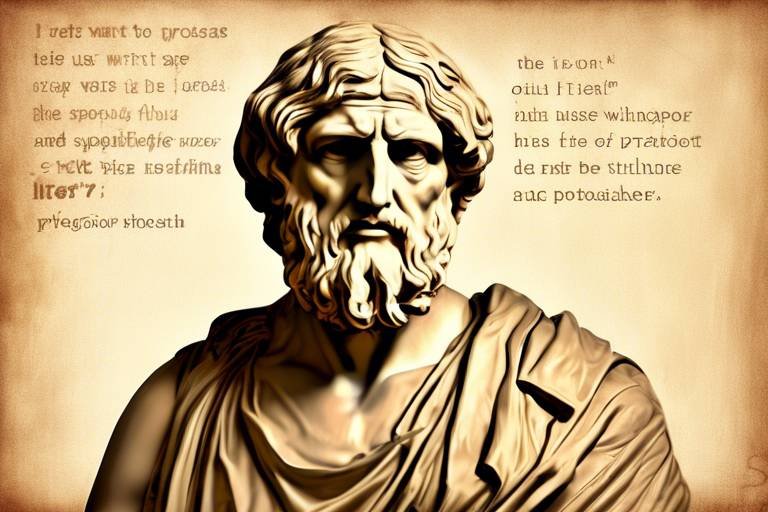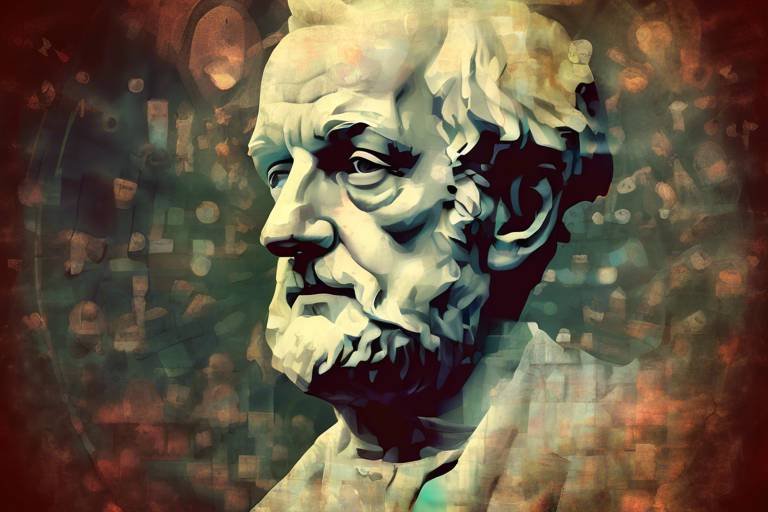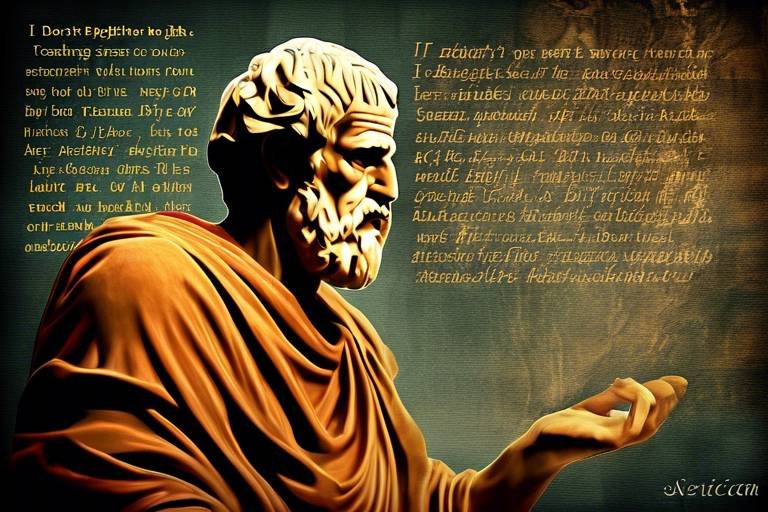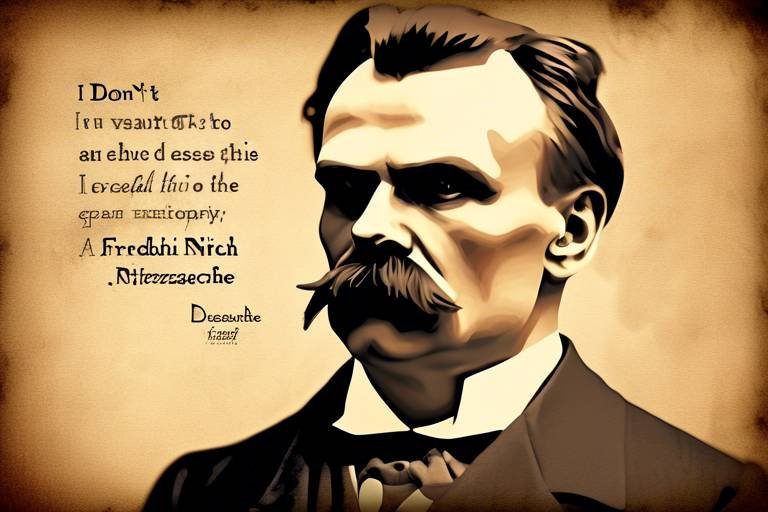Protagoras - The First Sophist Philosopher
Protagoras, often hailed as the first sophist philosopher, was a revolutionary thinker whose ideas continue to resonate through the ages. Born in the ancient city of Abdera around 490 BCE, he emerged during a time when Greek philosophy was undergoing significant transformation. His contributions to the realm of thought were not just influential; they were, in many ways, groundbreaking. Imagine a world where the very essence of truth and morality was up for debate—this was the world that Protagoras helped to shape.
What makes Protagoras stand out is his bold assertion that “man is the measure of all things.” This statement encapsulates his belief in relativism, suggesting that our understanding of truth is inherently subjective. It's as if he was holding up a mirror to society, reflecting the idea that each individual's perception is as valid as the next. This was a radical departure from the prevailing notions of absolute truth, and it set the stage for a philosophical dialogue that would last for centuries.
Protagoras was not just a thinker; he was a teacher who traveled extensively, sharing his ideas and engaging with students from all walks of life. His teachings emphasized the importance of rhetoric and debate, equipping his students with the tools necessary to navigate the complexities of human thought and society. It's fascinating to consider how his influence permeated various aspects of education, encouraging learners to question and explore rather than accept ideas at face value.
In addition to his contributions to philosophy, Protagoras' thoughts on ethics and epistemology sparked critical conversations that challenged societal norms. He argued that moral values are not universal but rather shaped by cultural contexts, which led to a reevaluation of what constitutes good and evil. This perspective was revolutionary, as it opened the door for discussions about morality that are still relevant today.
As we delve deeper into Protagoras' life and ideas, it becomes clear that his legacy is not confined to ancient history. His thoughts have transcended time, influencing modern debates on subjectivity and the nature of reality. Contemporary philosophers continue to grapple with his assertions, examining their implications in our understanding of knowledge and ethics.
- Who was Protagoras?
Protagoras was an ancient Greek philosopher known for his contributions to relativism and sophistry, famously stating that "man is the measure of all things." - What is relativism?
Relativism is the philosophical idea that truth and moral values are not absolute but vary based on individual perspectives and cultural contexts. - How did Protagoras influence education?
Protagoras emphasized the importance of rhetoric and critical thinking, encouraging students to engage in debate and explore diverse perspectives. - What were Protagoras' views on ethics?
He believed that moral values are subjective and shaped by societal norms, challenging the notion of universal morality.

Life and Background
Protagoras was born in Abdera, Greece, around 490 BCE. This coastal city, known for its rich intellectual tradition, served as the perfect backdrop for a thinker who would go on to challenge the very foundations of knowledge and truth. His early life was marked by a thirst for understanding and a curiosity that would shape his philosophical outlook. Growing up in a society that valued rhetoric and debate, Protagoras was influenced by the vibrant culture around him, which emphasized the importance of persuasion and the art of argumentation.
As he matured, Protagoras became increasingly fascinated with the nature of human experience and perception. He traveled extensively, absorbing ideas from various schools of thought and engaging with other philosophers of his time. His experiences not only broadened his horizons but also instilled in him a sense of skepticism towards absolute truths. It was during this period that he began to formulate his most famous assertion: "Man is the measure of all things."
This statement encapsulates his belief in subjective perception and the idea that individual experiences shape our understanding of reality. Protagoras' views were revolutionary, as they posited that knowledge is not a fixed entity but rather a fluid concept that varies from person to person. To illustrate this, consider how two people can witness the same event yet interpret it in entirely different ways. This phenomenon is at the heart of Protagorean philosophy, which emphasizes the importance of context and perspective.
Moreover, Protagoras' background in a city that thrived on intellectual discourse allowed him to engage with various ideas and challenge the status quo. His teachings attracted a diverse group of followers, eager to learn from a master who was not afraid to question established norms. In many ways, Protagoras was a pioneer of the sophistic movement, which sought to explore the complexities of human thought and behavior.
In summary, Protagoras' early life and experiences were instrumental in shaping his philosophical contributions. His upbringing in Abdera, combined with his travels and intellectual pursuits, laid the groundwork for his revolutionary ideas on relativism and human perception. As we delve deeper into his philosophical contributions, it becomes clear that Protagoras was not just a thinker of his time but a lasting influence on the trajectory of Western philosophy.

Philosophical Contributions
Protagoras, often hailed as the first Sophist philosopher, made groundbreaking contributions to philosophical thought that resonate even today. His assertion that “man is the measure of all things” is a statement that encapsulates his belief in relativism and the subjective nature of truth. This idea challenges the conventional understanding of absolute truths, suggesting instead that our perceptions shape our reality. Imagine walking through a gallery of art; each painting can evoke different emotions and interpretations depending on the viewer's background and experiences. In this way, Protagoras emphasizes that truth is not a one-size-fits-all concept but rather a tapestry woven from individual perspectives.
At the heart of Protagoras' philosophy is the notion of relativism. He proposed that knowledge and truth are not universal but rather contingent upon the individual’s context and experiences. This revolutionary idea posed a direct challenge to the prevailing notions of absolute truth that dominated philosophical discourse at the time. To illustrate, consider the following table that summarizes key aspects of Protagorean relativism:
| Aspect | Protagorean View | Traditional View |
|---|---|---|
| Nature of Truth | Subjective; varies by individual | Objective; universal and unchanging |
| Knowledge Acquisition | Dependent on personal experience | Acquired through reason and logic |
| Moral Values | Relative to societal norms | Absolute moral truths exist |
Protagoras’ ideas didn’t stop at truth and knowledge; they extended into the realm of ethics as well. He argued that moral values are inherently subjective, shaped by societal norms and cultural contexts. This perspective sparked vibrant discussions about the nature of good and evil, leading to questions such as: Is there a universal morality, or is it all just a product of social consensus? His views encouraged people to think critically about the ethical frameworks they operated within, ultimately paving the way for more nuanced discussions about morality in philosophy.
Moreover, Protagoras’ contributions significantly influenced epistemology—the study of knowledge. By questioning how knowledge is acquired and understood, he opened the door for future philosophers like Socrates and Plato to explore these themes further. His emphasis on the subjective nature of knowledge invited a reevaluation of how we approach learning and understanding in various fields, from science to art. In a world where information flows freely and rapidly, Protagoras' insights remind us that our interpretations of knowledge are often filtered through our unique lenses.
However, Protagoras' revolutionary ideas were not without their critics. His contemporaries, particularly Socrates, took issue with his relativistic views, arguing for the importance of objective truth in philosophical discourse. This tension between relativism and absolutism set the stage for some of the most profound debates in Western philosophy, highlighting the ongoing struggle to reconcile individual perspectives with universal truths.
In summary, Protagoras’ philosophical contributions laid the groundwork for discussions about truth, ethics, and knowledge that continue to be relevant today. His ideas encourage us to consider the complexities of our perceptions and the ways in which our experiences shape our understanding of the world around us.

man is the measure of all things,
This article explores the life and ideas of Protagoras, a pivotal figure in ancient philosophy, known for his contributions to relativism and the development of sophistry in classical thought.
Protagoras was born in Abdera, Greece, around 490 BCE. His early life and experiences shaped his philosophical outlook, leading him to become one of the most influential thinkers of his time.
Protagoras is best known for the assertion that man is the measure of all things, a statement that emphasizes subjective perception and relativism in understanding truth and knowledge.
His concept of relativism suggests that truth varies based on individual perspectives, challenging traditional notions of absolute truth and laying groundwork for future philosophical debates.
Protagoras' views influenced ethical discussions, arguing that moral values are subjective and depend on societal norms, which sparked conversations about the nature of good and evil.
His ideas also shaped epistemology, questioning how knowledge is acquired and understood, ultimately impacting later philosophers like Socrates and Plato.
Protagoras faced criticism from contemporaries, particularly Socrates, who challenged his relativistic views, emphasizing the importance of objective truth in philosophical discourse.
Protagoras' legacy endures through his impact on philosophy, rhetoric, and education, influencing both ancient and modern thinkers in their exploration of knowledge and truth.
Contemporary philosophers continue to engage with Protagoras' ideas, examining their relevance in discussions about subjectivity, ethics, and the nature of reality.
His approach to knowledge and debate has influenced educational practices, promoting critical thinking and the exploration of diverse perspectives in learning environments.
When Protagoras proclaimed that “man is the measure of all things,” he was diving headfirst into the deep waters of subjective experience. Imagine standing on a shore, looking out at the vast ocean; the waves are different for each person, just as perceptions of truth vary from one individual to another. This statement encapsulates the essence of his philosophy, suggesting that there are no absolute truths, only interpretations shaped by human experience.
To break it down further, think about how we perceive colors. One person may see a vibrant blue sky, while another might describe it as a dull grey due to their mood or environmental context. This is Protagoras' point in a nutshell: our understanding of reality is filtered through our individual lenses, influenced by our emotions, experiences, and cultural backgrounds.
Moreover, this idea has profound implications. It challenges us to reconsider our approach to knowledge and truth. If we accept that each person's perspective holds validity, we open the door to richer dialogues and deeper understanding. However, it also raises questions about the nature of ethics and morality. If what is true for one person isn't necessarily true for another, how do we establish a common ground for discussions about right and wrong?
In essence, Protagoras invites us to embrace the complexity of human experience. His assertion doesn't diminish the pursuit of knowledge; instead, it enhances it by encouraging us to listen, learn, and grow from each other's perspectives. It’s a call to acknowledge that while we may not all see the same truth, every viewpoint contributes to the mosaic of human understanding.
- What does "man is the measure of all things" mean?
This phrase suggests that individual perception shapes reality, implying that truth is subjective. - How did Protagoras influence modern philosophy?
His ideas on relativism and subjective truth continue to spark discussions in contemporary ethical and epistemological debates. - Why was Protagoras criticized by philosophers like Socrates?
Socrates challenged Protagoras' relativism, advocating for the existence of objective truths that transcend individual perspectives.

a statement that emphasizes subjective perception and relativism in understanding truth and knowledge.
This article explores the life and ideas of Protagoras, a pivotal figure in ancient philosophy, known for his contributions to relativism and the development of sophistry in classical thought.
Protagoras was born in Abdera, Greece, around 490 BCE. His early life and experiences shaped his philosophical outlook, leading him to become one of the most influential thinkers of his time.
Protagoras is best known for the assertion that man is the measure of all things, a statement that emphasizes subjective perception and relativism in understanding truth and knowledge.
His concept of relativism suggests that truth varies based on individual perspectives, challenging traditional notions of absolute truth and laying groundwork for future philosophical debates.
Protagoras' views influenced ethical discussions, arguing that moral values are subjective and depend on societal norms, which sparked conversations about the nature of good and evil.
His ideas also shaped epistemology, questioning how knowledge is acquired and understood, ultimately impacting later philosophers like Socrates and Plato.
Protagoras faced criticism from contemporaries, particularly Socrates, who challenged his relativistic views, emphasizing the importance of objective truth in philosophical discourse.
Protagoras' legacy endures through his impact on philosophy, rhetoric, and education, influencing both ancient and modern thinkers in their exploration of knowledge and truth.
Contemporary philosophers continue to engage with Protagoras' ideas, examining their relevance in discussions about subjectivity, ethics, and the nature of reality.
His approach to knowledge and debate has influenced educational practices, promoting critical thinking and the exploration of diverse perspectives in learning environments.
When Protagoras declared that man is the measure of all things, he wasn't just throwing around philosophical jargon; he was shaking the very foundations of how we perceive reality. Imagine standing in front of a beautiful painting. One person might see it as a masterpiece, while another could view it as a mere splatter of colors. This difference in perception illustrates Protagoras' idea that our understanding of truth is deeply personal and subjective. In essence, each individual's experience shapes their version of reality, making it unique and valid in its own right.
This notion of relativism has profound implications, not just in philosophy but in our daily lives. Consider how we interpret news stories or social issues. Our backgrounds, beliefs, and emotions color our perceptions, leading to a kaleidoscope of truths that coexist, often in conflict with one another. Protagoras invites us to reflect on this complexity, challenging us to recognize that what we hold as 'truth' may not be universal but rather a product of our individual lenses.
Furthermore, this perspective encourages a more empathetic approach to discourse. If we acknowledge that others may perceive the world differently, we open the door to dialogue and understanding. This is especially crucial in a world rife with polarization, where debates can quickly turn into shouting matches. Instead, by embracing the idea that multiple truths exist, we can foster a culture of respect and curiosity.
In summary, Protagoras' assertion serves as a reminder that our perceptions are not only valid but essential to the broader tapestry of human experience. It challenges us to question our assumptions and engage with others' viewpoints, ultimately enriching our understanding of truth and knowledge.
- Who was Protagoras?
Protagoras was an ancient Greek philosopher, often regarded as the first sophist, known for his contributions to relativism and ethics. - What does "man is the measure of all things" mean?
This statement signifies that individual perception shapes one's understanding of truth and knowledge, emphasizing the subjective nature of reality. - How did Protagoras influence modern philosophy?
His ideas on relativism and ethics continue to resonate, prompting discussions about subjectivity and the nature of truth in contemporary philosophical discourse. - What criticisms did Protagoras face?
Protagoras faced criticism from philosophers like Socrates, who argued that his relativistic views undermined the pursuit of objective truth.

Relativism Explained
Relativism, as proposed by Protagoras, is a fascinating concept that challenges our conventional understanding of truth. Imagine standing in a crowded room, each person perceiving the same event through their unique lens—some might find it humorous, while others could view it as tragic. This is the essence of Protagorean relativism: the idea that truth is not a one-size-fits-all garment, but rather a collection of perspectives shaped by individual experiences and cultural contexts.
Protagoras famously declared that "man is the measure of all things," which suggests that our understanding of reality is inherently subjective. This statement raises intriguing questions: What if there is no absolute truth? What if every belief is equally valid within its context? These questions invite us to reconsider our assumptions about knowledge and understanding. For Protagoras, the implications of relativism extend beyond mere philosophical musings; they touch upon the very fabric of human interaction and societal norms.
To illustrate this idea further, consider the following scenarios:
- Art Appreciation: One person may view a piece of abstract art as a profound expression of emotion, while another may see it as meaningless splashes of color. Both perspectives hold validity in their own right.
- Moral Judgments: In one culture, a practice may be deemed acceptable, while in another, it could be viewed as unethical. Protagoras would argue that these judgments reflect the values of their respective societies, not an objective moral standard.
Protagoras' relativism serves as a counterpoint to the idea of objective truth, which posits that certain truths exist independently of human beliefs. This philosophical tension invites robust debates, pushing thinkers to grapple with the implications of defining truth in a world filled with diverse perspectives. By embracing relativism, we can foster a deeper understanding of the complexities of human experience, ultimately enriching our discussions about knowledge, morality, and reality.
In essence, Protagorean relativism encourages us to remain open-minded and considerate of differing viewpoints. It challenges us to ask ourselves: How do our backgrounds shape our understanding of truth? This inquiry not only deepens our philosophical explorations but also enhances our interpersonal relationships, reminding us that every perspective has its own story to tell.

Impact on Ethics
Protagoras’ influence on ethics is nothing short of revolutionary. His assertion that "man is the measure of all things" fundamentally altered the way we approach moral philosophy. This idea suggests that our understanding of what is right and wrong is not fixed but rather shaped by individual experiences and societal contexts. In essence, Protagoras argued that **moral values are subjective**, varying from one culture to another and even from one person to another. This perspective opened the floodgates for debates about morality that continue to this day.
Imagine walking through a bustling marketplace where different vendors sell their goods. Each vendor has a unique way of presenting their products, influenced by their culture, experiences, and personal beliefs. Just like in that marketplace, Protagoras believed that ethics is a **diverse tapestry woven from various threads of human experience**. This means that what is considered ethical in one society might be viewed as unethical in another. For instance, practices that are acceptable in some cultures may be taboo in others, highlighting the importance of context in moral reasoning.
In practical terms, the implications of Protagorean ethics are profound. It challenges us to consider the following:
- How do our backgrounds influence our moral judgments?
- Can there be a universal standard for ethics, or is it inherently subjective?
- What role does societal consensus play in shaping our moral beliefs?
These questions encourage a more inclusive dialogue about ethics, prompting us to listen to diverse perspectives rather than adhering strictly to a singular moral framework. Protagoras’ relativism insists that ethical discussions should embrace **variety and complexity**, recognizing that different viewpoints can coexist without one being inherently superior to another.
Furthermore, Protagoras' ideas led to the emergence of **sophistry**, where rhetoric and argumentation became essential tools in ethical discussions. Sophists, who were often seen as controversial figures, utilized Protagorean thought to argue for the relativity of truth and morality, emphasizing the power of persuasion in ethical debates. This shift not only influenced philosophers of his time but also paved the way for future thinkers to explore the fluid nature of ethics.
In conclusion, Protagoras’ impact on ethics cannot be overstated. His belief in the subjectivity of moral values invites us to engage in ongoing conversations about right and wrong, urging us to embrace a world where **diverse perspectives enrich our understanding of ethics**. This legacy continues to resonate, challenging us to reflect on our moral beliefs and the influences that shape them.
- What is Protagoras known for? Protagoras is best known for his assertion that "man is the measure of all things," emphasizing the subjective nature of truth and morality.
- How did Protagoras influence modern ethics? His ideas on relativism have led to ongoing discussions about the nature of morality, encouraging a more inclusive approach to ethical debates.
- What are the implications of Protagorean ethics? Protagorean ethics suggests that moral values vary across cultures and individuals, prompting us to consider the context in which ethical judgments are made.

Influence on Epistemology
Protagoras' contributions to epistemology are nothing short of revolutionary. He dared to challenge the traditional views of knowledge that were prevalent during his time. By asserting that “man is the measure of all things,” he introduced a radical idea that knowledge is not an absolute entity but rather a construct shaped by individual experiences and perceptions. This perspective opened the floodgates for a more nuanced understanding of how we acquire knowledge and what it means to know something.
To illustrate this, consider how two people can witness the same event but interpret it differently. One might see a glass as half full, while the other sees it as half empty. This simple analogy highlights Protagoras' assertion that our understanding of the world is filtered through our subjective lenses. Thus, knowledge becomes a personal journey rather than a universal truth. This idea not only challenged the philosophers of his time but also laid the groundwork for future thinkers who would grapple with the nature of knowledge.
Protagoras’ ideas also sparked debates about the role of perception in knowledge acquisition. He posited that since all knowledge is based on individual experience, it raises questions about the reliability of our senses and the validity of our beliefs. This notion is crucial, as it leads us to ask: How can we trust what we know if it is merely a reflection of our personal experiences? This inquiry into the nature of knowledge has echoed through the ages, influencing philosophers like Socrates, Plato, and even modern epistemologists.
Moreover, Protagoras’ relativism paved the way for discussions about the limits of human understanding. He invited people to consider that knowledge might be inherently uncertain and fluid, rather than fixed and absolute. This perspective not only challenged the dogmas of the past but also encouraged a more open-minded approach to learning and understanding. In essence, Protagoras acted as a catalyst for a shift in epistemological thought, prompting future generations to explore the complexities of knowledge.
In summary, Protagoras' influence on epistemology is profound and far-reaching. By advocating for a subjective understanding of knowledge, he opened the door to critical discussions about perception, belief, and the nature of truth. His legacy continues to inspire contemporary debates, reminding us that the quest for knowledge is as much about the journey as it is about the destination.
- What is Protagoras known for? Protagoras is best known for his assertion that "man is the measure of all things," emphasizing relativism in understanding truth and knowledge.
- How did Protagoras influence modern philosophy? His ideas on relativism and subjective knowledge have shaped discussions in epistemology, ethics, and even education, influencing both ancient and modern thinkers.
- What are the implications of Protagoras' relativism? His relativistic views challenge the notion of absolute truth, suggesting that knowledge is shaped by individual perspectives and societal norms.

Opposition and Critique
Protagoras, while celebrated as a pivotal figure in the realm of philosophy, was not without his detractors. One of the most vocal critics of his relativistic views was none other than Socrates. This ancient philosopher, known for his method of questioning, took a firm stand against Protagoras’ assertion that “man is the measure of all things.” Socrates believed that such a perspective undermined the very essence of truth. After all, if truth is subjective and varies from person to person, how can we ever agree on what is right or wrong? It poses a significant question: can we navigate a world where everyone has their own version of truth?
Socrates argued that without objective standards of truth, moral and ethical discussions would devolve into mere opinion. This critique highlights a fundamental tension in philosophical discourse: the struggle between relativism and the quest for universal truths. In Socratic dialogues, we see a relentless pursuit of definitions and clarity—something that Protagoras’ relativism seemed to challenge. The Socratic method, which relies on dialectic questioning, was a direct counter to the sophistic approach that Protagoras embodied, leading to a philosophical clash that would shape future debates.
Moreover, the criticisms of Protagoras extended beyond Socrates. Other philosophers and thinkers of the time questioned the implications of his ideas. They feared that if every individual held their own truth, societal cohesion could be threatened. For instance, the implications for law and governance were profound. How could laws be upheld if they were based on subjective interpretations? This concern led to a broader discussion about the role of consensus in society and the necessity of some form of objective truth to maintain order.
In summary, while Protagoras' ideas opened the door to a rich exploration of subjectivity and perception, they also sparked significant opposition. The critiques he faced from contemporaries like Socrates not only challenged his views but also laid the groundwork for future philosophical inquiry. As we reflect on these debates, we can appreciate how the clash of ideas has shaped our understanding of truth, ethics, and knowledge throughout history.
- What is Protagoras best known for? Protagoras is best known for his assertion that "man is the measure of all things," which emphasizes relativism in understanding truth.
- Who were Protagoras' main critics? His main critics included Socrates, who challenged the implications of relativism on ethics and truth.
- How did Protagoras influence modern philosophy? Protagoras' ideas continue to influence discussions about subjectivity, ethics, and the nature of reality in contemporary philosophy.
- What was the significance of the Socratic method in relation to Protagoras? The Socratic method emphasized the pursuit of objective truth and clarity, directly opposing Protagoras' relativistic views.

Legacy and Influence
Protagoras' legacy is a rich tapestry woven into the very fabric of Western philosophy. His innovative ideas did not simply fade into obscurity; instead, they sparked a flame of inquiry that ignited the minds of countless philosophers, educators, and thinkers throughout history. One of the most significant aspects of his influence is seen in the realm of epistemology and ethics, where his ideas about relativism and subjective truth continue to resonate. Imagine a world where every perspective holds weight, where truth is not a rigid construct but a fluid concept shaped by individual experiences. This radical notion laid the groundwork for future philosophical debates, challenging thinkers to reconsider the nature of knowledge itself.
In the realm of ethics, Protagoras' assertion that moral values are not universal but rather shaped by societal norms opened the door for discussions about the subjective nature of good and evil. This idea has profound implications, leading to a more nuanced understanding of morality that acknowledges the diversity of human experience. For instance, consider how different cultures have varying beliefs about justice and virtue. Protagoras encouraged us to explore these differences rather than dismiss them, fostering a spirit of dialogue and understanding.
Moreover, Protagoras' influence extends beyond philosophy into the fields of rhetoric and education. His emphasis on debate and dialogue has shaped pedagogical practices, promoting critical thinking and the exploration of diverse perspectives in learning environments. In modern classrooms, educators often encourage students to engage in discussions that challenge their viewpoints, a practice that echoes Protagorean thought. This approach not only cultivates analytical skills but also prepares students to navigate an increasingly complex world where multiple truths coexist.
To illustrate the enduring impact of Protagoras, consider the following table that highlights key areas of his influence:
| Area of Influence | Impact |
|---|---|
| Epistemology | Challenged absolute truths, leading to debates on the nature of knowledge. |
| Ethics | Promoted the idea of moral relativism, influencing discussions on morality. |
| Rhetoric | Encouraged the use of dialogue and debate in understanding complex ideas. |
| Education | Inspired teaching methods that value critical thinking and diverse perspectives. |
As we delve deeper into contemporary philosophy, we find that Protagoras' ideas remain relevant. Modern thinkers grapple with questions of subjectivity and the nature of reality, often referencing Protagorean thought as a foundation for their arguments. His influence is not confined to ancient texts; it permeates discussions on ethics, perception, and the human experience today. In a world that often feels polarized, Protagoras reminds us of the importance of understanding different viewpoints and the value of dialogue.
- What is Protagoras best known for? Protagoras is best known for his assertion that "man is the measure of all things," which emphasizes relativism in understanding truth and knowledge.
- How did Protagoras influence modern philosophy? His ideas on relativism and subjective truth continue to shape contemporary discussions in epistemology and ethics.
- What impact did Protagoras have on education? Protagoras' approach to knowledge and debate has influenced educational practices by promoting critical thinking and the exploration of diverse perspectives.

Modern Interpretations
This article explores the life and ideas of Protagoras, a pivotal figure in ancient philosophy, known for his contributions to relativism and the development of sophistry in classical thought.
Protagoras was born in Abdera, Greece, around 490 BCE. His early life and experiences shaped his philosophical outlook, leading him to become one of the most influential thinkers of his time.
Protagoras is best known for the assertion that man is the measure of all things, a statement that emphasizes subjective perception and relativism in understanding truth and knowledge.
His concept of relativism suggests that truth varies based on individual perspectives, challenging traditional notions of absolute truth and laying groundwork for future philosophical debates.
Protagoras' views influenced ethical discussions, arguing that moral values are subjective and depend on societal norms, which sparked conversations about the nature of good and evil.
His ideas also shaped epistemology, questioning how knowledge is acquired and understood, ultimately impacting later philosophers like Socrates and Plato.
Protagoras faced criticism from contemporaries, particularly Socrates, who challenged his relativistic views, emphasizing the importance of objective truth in philosophical discourse.
Protagoras' legacy endures through his impact on philosophy, rhetoric, and education, influencing both ancient and modern thinkers in their exploration of knowledge and truth.
In today's world, the ideas of Protagoras resonate more than ever. As we navigate through an era characterized by information overload and diverse viewpoints, his assertion that "man is the measure of all things" serves as a poignant reminder of the subjective nature of truth. Modern philosophers and scholars often revisit Protagorean thought to analyze its implications on contemporary issues such as ethics, politics, and personal identity.
For instance, in the realm of ethics, Protagoras' relativism challenges rigid moral frameworks, suggesting that our understanding of right and wrong is shaped by cultural contexts and personal experiences. This perspective invites ongoing debates about the nature of morality, prompting questions like: Is there an absolute moral truth, or is morality inherently subjective? Such discussions are vital in a multicultural society where differing values often collide.
Additionally, Protagoras' ideas have found their way into educational practices. His emphasis on debate and critical thinking encourages students to engage with multiple perspectives, fostering an environment where questioning and exploration are valued. This approach can be seen in modern classrooms that promote dialogue over dogma, allowing learners to develop their own understanding of complex issues.
Moreover, contemporary philosophers often draw parallels between Protagorean thought and postmodernism, which similarly asserts that reality is constructed through language and social interactions. This connection raises intriguing questions about the nature of reality itself: Is reality an objective entity, or is it shaped by our perceptions and experiences? As we delve deeper into these inquiries, the relevance of Protagoras' ideas becomes increasingly apparent, highlighting the enduring nature of his contributions to philosophy.
- What is Protagoras best known for?
Protagoras is best known for his assertion that "man is the measure of all things," emphasizing the subjective nature of truth. - How did Protagoras influence modern philosophy?
His ideas on relativism and ethics continue to spark discussions about morality, knowledge, and the nature of reality in contemporary philosophy. - What is the significance of Protagorean thought in education?
Protagorean thought promotes critical thinking and debate, encouraging students to explore diverse perspectives in their learning.

Protagorean Thought in Education
Protagoras, often hailed as the father of sophistry, revolutionized the way we perceive education and knowledge. His approach emphasized the importance of critical thinking and the exploration of diverse perspectives, which are fundamental in today’s educational practices. Imagine walking into a classroom where every opinion is valued, and students are encouraged to challenge ideas rather than just memorize facts. This is the essence of Protagorean thought—a vibrant exchange of ideas that fosters an environment of intellectual curiosity.
One of the most significant contributions of Protagorean philosophy to education is the belief that knowledge is not a fixed entity but rather a fluid construct shaped by individual experiences and societal contexts. This perspective invites educators to adopt a more student-centered approach, where the focus shifts from rote learning to engaging students in discussions that allow them to express their views and question the status quo. For instance, in a Protagorean-inspired classroom, a teacher might pose a thought-provoking question such as, “What is truth?” and encourage students to share their interpretations based on their backgrounds and experiences.
Moreover, Protagoras' assertion that “man is the measure of all things” can be seen as a call for inclusivity in educational settings. By recognizing that each student brings a unique perspective to the table, educators can create a rich tapestry of ideas that enhances the learning experience. This approach not only promotes critical thinking but also prepares students for a world that values diverse viewpoints. In essence, Protagorean thought encourages a form of education that is not just about acquiring knowledge, but about understanding and appreciating the complexities of human experience.
To illustrate how Protagorean ideas can be integrated into modern education, consider the following table that outlines key principles and their applications:
| Protagorean Principle | Application in Education |
|---|---|
| Subjectivity of Knowledge | Encouraging students to share personal insights and experiences during discussions. |
| Critical Thinking | Implementing debate formats where students must defend various viewpoints. |
| Value of Dialogue | Creating collaborative projects that require teamwork and communication. |
As we explore the implications of Protagorean thought in education, it becomes clear that fostering an environment where students can freely express their ideas leads to a more enriching learning experience. This approach not only cultivates critical thinkers but also prepares students to navigate a world filled with diverse opinions and beliefs. In a nutshell, Protagorean philosophy encourages us to embrace the complexity of knowledge and to recognize that learning is a lifelong journey shaped by our interactions with others.
- What is Protagorean philosophy? Protagorean philosophy centers around the idea that truth and knowledge are subjective and vary from person to person.
- How does Protagorean thought apply to education? It promotes critical thinking, encourages diverse perspectives, and values dialogue in the learning process.
- Why is critical thinking important in education? Critical thinking equips students to analyze situations, make informed decisions, and engage with differing viewpoints effectively.
- Can Protagorean ideas be applied in modern classrooms? Yes, educators can integrate these ideas by fostering discussions, encouraging collaboration, and valuing student input.
Frequently Asked Questions
- Who was Protagoras?
Protagoras was a prominent ancient Greek philosopher from Abdera, known as the first sophist. He lived around 490 BCE and is most famous for his assertion that "man is the measure of all things," which highlights his belief in relativism and subjective perception of truth.
- What is relativism according to Protagoras?
Relativism, as proposed by Protagoras, suggests that truth is not absolute but varies depending on individual perspectives. This means that what may be true for one person might not be true for another, challenging the conventional understanding of objective truths.
- How did Protagoras influence ethics?
Protagoras had a significant impact on ethical discussions by arguing that moral values are subjective and shaped by societal norms. His views sparked debates about the nature of good and evil, suggesting that our understanding of morality is influenced by culture and context.
- What was Protagoras' impact on epistemology?
In epistemology, Protagoras questioned how knowledge is acquired and understood. His ideas laid the groundwork for future philosophers like Socrates and Plato, who further explored the nature of knowledge and its relationship to truth.
- How did Protagoras' contemporaries respond to his ideas?
Protagoras faced criticism from contemporaries, particularly Socrates, who challenged his relativistic views. Socrates emphasized the importance of objective truth, arguing that without it, philosophical discourse could become meaningless.
- What is Protagoras' legacy today?
Protagoras' legacy endures through his influence on philosophy, rhetoric, and education. His ideas continue to resonate with modern thinkers, particularly in discussions about subjectivity, ethics, and the nature of reality.
- How are Protagorean ideas applied in education?
Protagoras' approach to knowledge and debate has significantly influenced educational practices. His emphasis on critical thinking and exploring diverse perspectives promotes a richer learning environment, encouraging students to engage with various viewpoints.



















